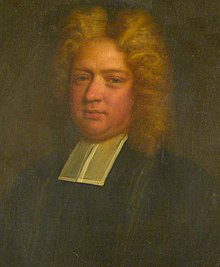William Sherlock on Acts 2:23
"DECREES. Acts ii: 23. What does St. Peter say was done by the determinate counsel and foreknowledge of God? Did they take him, and by wicked hands crucify and slay him by the determinate counsel and foreknowledge of God? This is not said: but he was delivered, that is, put into their power, by the determinate counsel and foreknowledge of God? and then they took him and with wicked hands slew him: And then we must observe, that here are two distinct acts of God relating to this event; the determinate counsel, and the foreknowledge of God. The will or counsel of God, which he had fore-ordained, and predetermined, the Boule Proorismene was, that Christ should die an Expiatory Sacrifice for the sins of the world, which was a work of such stupendous wisdom, goodness, holiness, and justice, that nothing could more become God, than such counsels and decrees. But then by his Infinite prescience and foreknowledge he saw by what means this would be done, if he thought fit to permit it; viz., by the treachery of Judas, by the malice of the Scribes and Pharisees, and by the compliance of the Roman powers; and this he determined to permit, and to deliver him up into their hands; the certain effect of which would be, that they would take him, and with wicked hands crucify him, and slay him. So that though God did decree, that Christ should die, yet he did not decree, that Judas should betray him, or that the Scribes and Pharisees, and Pontius Pilate should condemn and crucify him; but this he foresaw, and this he decreed to permit, and to accomplish his own wise counsels for the salvation of mankind by such wicked instruments; and there is nothing in all this unworthy of God, or unbecoming the holiness of his providence: And thus it is with all other events which are decreed by God; he never decrees anything but what is holy and good; and though he many times accomplishes his wise decrees by the wickedness and sins of men, yet he never decrees their sins; but by his foresight and wonderful wisdom so disposes and orders things, as to make their sins, which they freely and resolvedly commit, and which nothing but an irresistible power could hinder them from committing, serve the wise and gracious ends of his Providence. This is wisdom too wonderful for us; but thus we know it may be, and thus the Scripture assures us it is."



Comments
Post a Comment